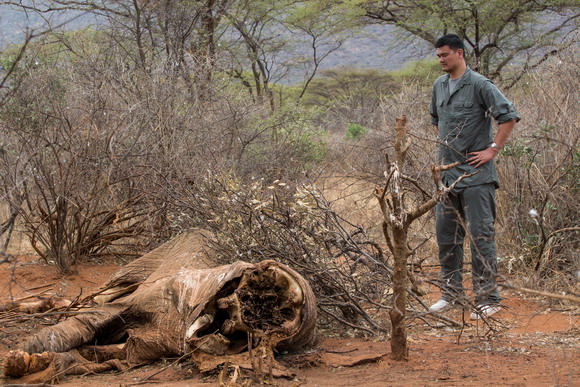Wildlife preservation plan struck with Kenya
By Zhao Shengnan (China Daily) Updated: 2013-08-22 07:37
|
 Yao Ming, Chinese basketball bigwig, stands by the remains of an elephant shot dead by poachers in Kenya, Aug 13, 2012. China has lent "extremely important" support to Kenya to help wildlife protection, said the African country's foreign minister. [Kristian Schmidt / Asianewsphoto] |
$5 billion in deals include China's aid for protection of animals in Africa
China has lent "extremely important" support to Kenya to help wildlife protection, said the African country's foreign minister.
"We have very many issues with the protection of wildlife, therefore we need some support from our partners and from friendly countries," Kenya's Foreign Affairs and International Trade Cabinet Secretary Amina Mohamed told China Daily one day after the countries signed a deal to improve Kenya's wildlife protection.
On Monday, China and Kenya sealed deals worth $5 billion to construct a railway line and an energy project, and protect wildlife in the East African country. The deals were signed in Beijing after talks President Xi Jinping held with Kenya's President Uhuru Kenyatta.

"We need some support to make sure of the equipment we need to protect the animals, and also the vehicles, for instance, to transport our wardens who would be surveying and monitoring their movement in our national parks," said Mohamed, a member of the presidential delegation on a state visit to China from Sunday to Friday.
"Also, we need the money for training. Some of the money we will get from China will be used for the training of the security agencies that can manage to control poaching," said the minister, who used to be deputy executive director of the United Nations Environment Programme.
These deals coincide with Kenya's wildebeest migration, which attracts tourists from around the world. The country's wildlife resources are the backbone of the tourism sector.
But according to the Convention on International Trade in Endangered Species of Wild Fauna and Flora, Kenya is both a source and a destination for illegal ivory products.
Well-armed criminal gangs in the African country have killed elephants for tusks and rhinos for their horns, which are shipped mainly to Asia for use in ornaments and medicines.
Chinese Ambassador to Kenya Liu Guangyuan said earlier this month that China will provide a grant to Kenya, specifically for wildlife conservation, to be used to safeguard elephants, rhinos and other endangered wildlife.
He Wenping, an expert on African studies at the Chinese Academy of Social Sciences, said wildlife protection and infrastructure construction will be the focuses of Chinese assistance in Kenya in the future, given that Kenya lacks the necessary means to protect the wildlife or enough infrastructure to cater to an increasing number of tourists.
"Such assistance will also help to improve the image of China, which used to be accused of violating laws and overlooking environmental protection abroad," He added.
According to Mohamed, the newly signed deal on a standard gauge railway linking Kenya's port of Mombasa to its border town of Malaba would "open up new areas for trade and bushiness" for the country.
The improved railway could cut the costs of moving freight across East Africa by 79 percent, according to Kenyan government calculations.
The agreements on energy projects will also help Kenya provide sufficient and affordable electricity to its people and manufacturing, Mohamed said, adding that only 40 percent of Kenya's population has access to electricity.
With cheaper energy, reasonable labor, as well as improved logistics and transportation, "it makes sense to move some of the Chinese factories to Kenya," she added.

China is already one of the key players in Kenya, constructing capital-intensive flagship projects, mostly roads. It is also Kenya's largest source of foreign direct investment and its second largest trade partner.
"Infrastructure development can help Africa to integrate, and many Chinese companies are contracting in our infrastructure projects. Chinese investments in Africa will help our economic growth," she said. But Mohamed said the manufacturing investment from China to Kenya is still not enough. "We can do much better," she said.
Mo Jingxi contributed to this story.
- China 'incredibly innovative' in many areas: Apple CEO
- City official: Guangzhou further committed to opening-up
- Jack Ma: Globalization backed by technology will cut inequality
- HNA confirms interest in ASEAN's infrastructure investment
- Comments on Xi's letter to 2017 Fortune Global Forum
- China to create more opportunities for the world: Xi
- US tax cuts impact on China two-sided: economists
- Chinese enterprises job fair to be held in Sri Lanka

















